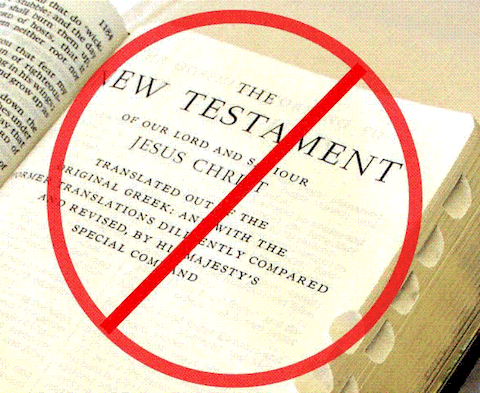
1001 Errors in the Christian Bible
Home
Dedication
Matthew
Mark
Luke
John
Acts
Contact Us
Luke -- Errors 383-389
#383
Luke 11: (KJV)
23 “He that is not with me is against me: and he that gathereth
not with me scattereth.”
Compare to Luke 9: (KJV)
50 “And Jesus said unto him, Forbid him not: for he that is not
against us is for us.”
What’s interesting here is that “Matthew” has the first
saying and “Mark” has the second saying so technically “Luke”
agrees with “Matthew” and “Mark”.
# 384
Luke 11: (KJV)
29 “And when the people were gathered thick together, he began
to say, This is an evil generation: they seek a sign; and there shall
no sign be given it, but the sign of Jonas the prophet.
30 For as Jonas was a sign unto the Ninevites, so shall also the Son of
man be to this generation.
31 The queen of the south shall rise up in the judgment with the men of
this generation, and condemn them: for she came from the utmost parts
of the earth to hear the wisdom of Solomon; and, behold, a greater than
Solomon is here.
32 The men of Nineve shall rise up in the judgment with this generation,
and shall condemn it: for they repented at the preaching of Jonas; and,
behold, a greater than Jonas is here.”
Compare to Matthew 12: (KJV)
39 “But he answered and said unto them, An evil and adulterous
generation seeketh after a sign; and there shall no sign be given to it,
but the sign of the prophet Jonas:
40 For as Jonas was three days and three nights in the whale's belly;
so shall the Son of man be three days and three nights in the heart of
the earth.”
According to “Matthew” the sign of Jonah will be a three day
and three night disappearance of the son of man while the implication
in “Luke” is that the sign of Jonah was Jonah’s preaching.
# 385
Luke 11: (KJV)
40 “Ye fools, did not he that made that which is without make
that which is within also?”
Compare to Matthew 5: (KJV)
22 “… but whosoever shall say, Thou fool, shall be in danger
of hell fire.”
Only fools really do fall in love one another.
# 386
Luke 12: (KJV)
53 “The father shall be divided against the son, and the son against
the father; the mother against the daughter, and the daughter against
the mother; the mother in law against her daughter in law, and the daughter
in law against her mother in law.”
Contradicted by Deuteronomy 5:16 (JPS):
“Honour thy father and thy mother, as HaShem thy G-d commanded
thee; that thy days may be long, and that it may go well with thee, upon
the land which HaShem thy G-d giveth thee.”
# 387
Luke 13: (KJV)
19 “It is like a grain of mustard seed, which a man took, and
cast into his garden; and it grew, and waxed a great tree; and the fowls
of the air lodged in the branches of it.”
Compare to Matthew 13: (KJV)
31 “Another parable put he forth unto them, saying, The kingdom
of heaven is like to a grain of mustard seed, which a man took, and sowed
in his field:”
The author of “Luke” apparently was unaware that during the
time he was supposedly describing there was a prohibition on planting
mustard seeds in gardens. The author of “Matthew” was aware
of this and used “field” instead of “garden”.
# 388
Luke 14: (KJV)
26 “If any man come to me, and hate not his father, and mother,
and wife, and children, and brethren, and sisters, yea, and his own life
also, he cannot be my disciple.”
Another anti parent saying. The Hebrew word for “hate” occasionally
has a meaning of “strong preference” in the Tanakh but the Greek
word used here always means “hate” elsewhere in the Christian
Bible and outside the Christian Bible. Suffice it to say that using “hate”
and “parents” in the same sentence is a bad choice of words.
# 389
Luke 14: (KJV)
27 “And whosoever doth not bear his cross, and come after me,
cannot be my disciple.”
“Cross” is an anachronistic translation. The underlying Greek
word always meant “stake”.